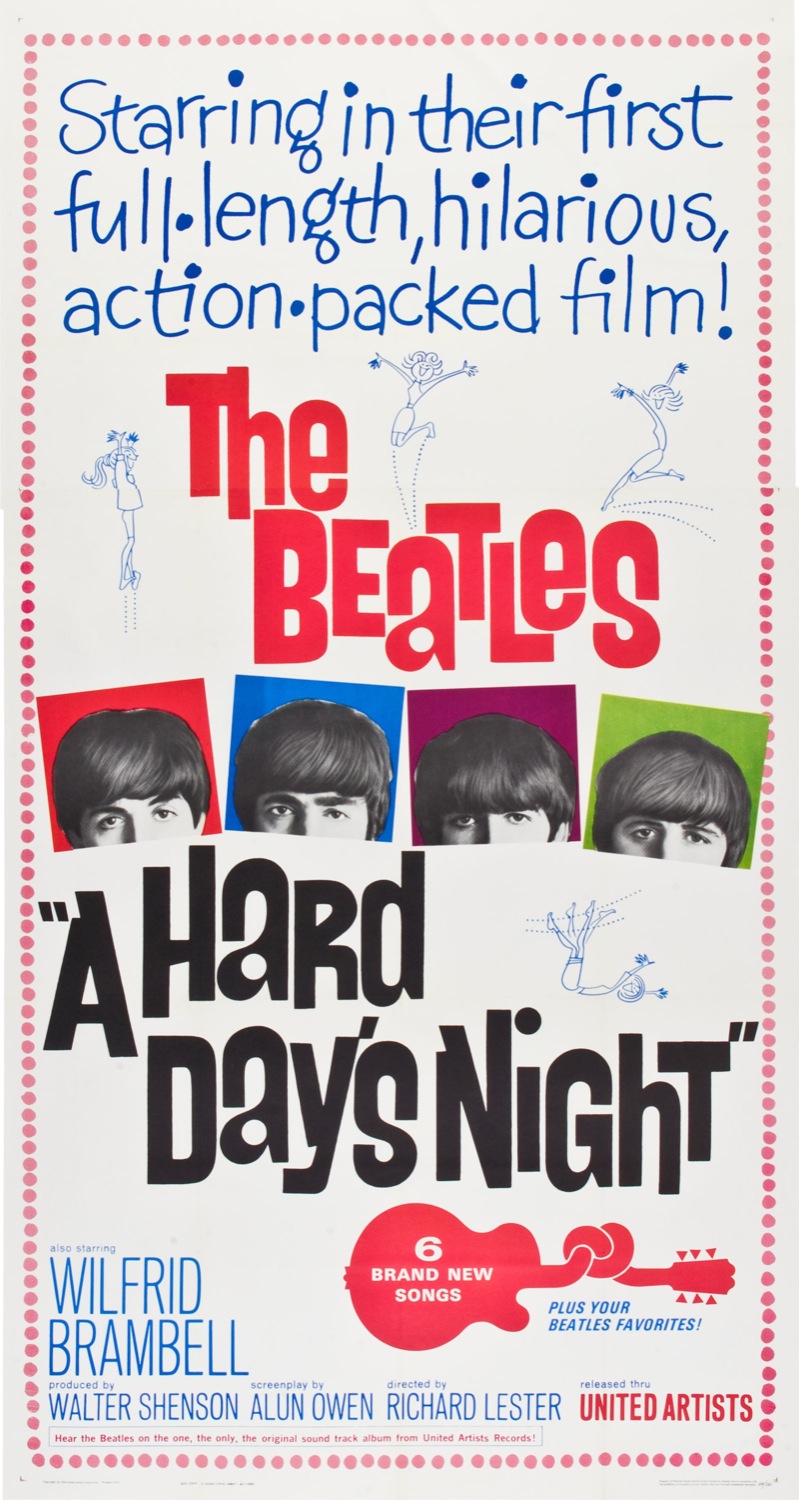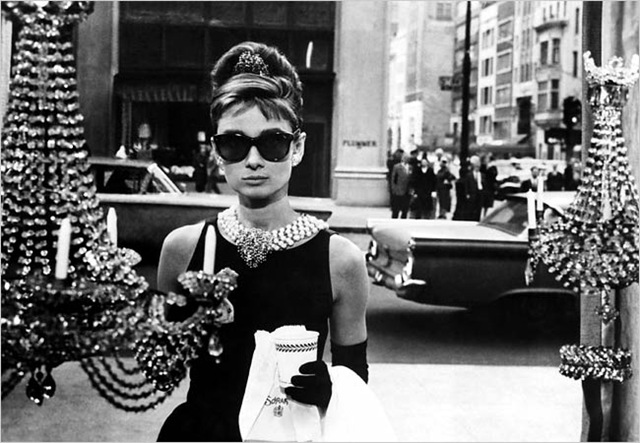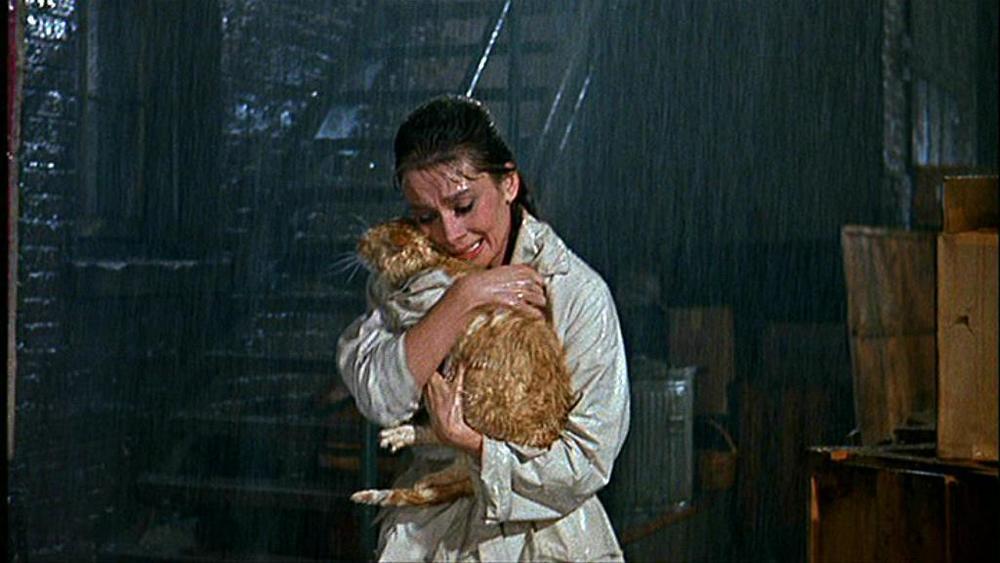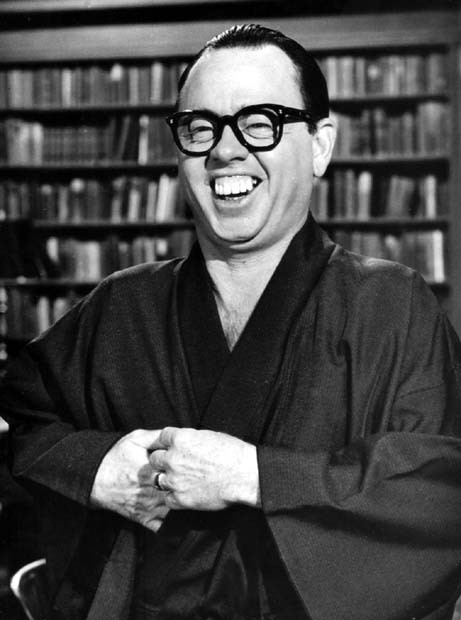A Hard Day's Night (1964)
Directed by: Richard Lester
Rating: ★★★★★ (Masterpiece)
screenplay by: Alun Owen
starring: John Lennon (John), Paul McCartney (Paul), George Harrison (George), Ringo Starr (Ringo), Wilfrid Brambell (Grandfather), Victor Spinetti (TV Director), Norman Rossington (Norm), and John Junkin (Shake).
Plot rundown: 48 hours in the lives of the Beatles, who must evade girls, guns, and grandfathers as they prepare for their next gig in a television theatre.
A review of my favorite movie, you say? Why, sure, why not!
What else can one say about a movie that's nearly perfect in all respects? that's a burst of explosive, corrosive energy of the screen? that's a dreamy relic which gives us relief from all the tired pop cliches of my generation and generations after me?
The Beatles' first feature film, directed by British New Wave master Richard Lester, will live on in the annals of film as being that different movie--something that could have easily become sentimental, dated garbage, but which instead became not only a picture-perfect encapsulation of its less-than-perfect times, but also a reaffirmation in everything we believe in: the healing power of music, the philosophy of fandom, our enchantment and desire to break free when we're young before it's too late. I know I still want to, and I'm glad John and Paul and George and Ringo and Grandfather feel the same way, too.
What is the movie about? Not that it rightly matters, because it has no plot. No, just a glance at two days in the lives of the world's best musical collaboration since Nero and The Violin. They run from girls, they ride trains, they quip smarmy one-liners to reporters, they come on stage, they tune their Rickenbackers, they sing, they finish, they ride away, repeat ad nauseum. It sounds pretty tiring, but for the viewer it never is. It is clear that the Beatles are in love with their craft and that they are genuine genius composers, but once in a while, they get bored of the famous life.
That's where the fun of the picture comes in.
 |
| George Harrison: inventor of the photo-booth. |
For the second half of the film, we see the Beatles running around doing random things. They gallivant about in a field to the tune of "Can't Buy Me Love". John Lennon chats with a woman who mistakes him for John Lennon. George Harrison is a non-conformist rebel who runs in with a clothing designer trying to make the latest buck on whatever the fuck it is the kids are into these days. Paul mills about playing piano and going "Zap" and "Shazam" every once in a while (if anything, Paul's the least defined and doesn't get to do much of anything in the movie). And Ringo? He, ironically enough, is the most interesting Beatle despite being the least creative in terms of songwriting. Hardly anyone who listens to the Beatles for long enough springs up to say Ringo's their favorite Beatle, but when they do, it's because of the riveting performance he gives in A Hard Day's Night as a lonely, slightly nebbish British boy who feels ashamed at not having done anything productive with his life and staying holed up in hotels rather than "living", as Grandfather suggests.
A good transition to say: who is Grandfather? He is the wily Irish old upstart, Paul's charge, who throws nearly all of the Beatles' hijinks into jeopardy. He causes trouble and sweet-talks dames with a distinctly playful Irish accent, playing off the Beatles' youthful yet slightly conformist image with a elderly yet vivacious charm. He is the true rebel of the group, the one that pulls the strings, if you will. "Don't worry, lad! Johnny McCartney will give 'em the old one-two!" he screams to Ringo as he makes a grand "escape" from a jail. Wilfrid Brambell is a delight to see when he's on screen, and provides one of the best supporting performances in any movie I've ever seen, bar none.
 |
| Don't mess with Grandpa. |
The other supporting players do well, too. Norman Rossington and John Junkin play Norm and Shake, two Abbott-and-Costello-like managers of the Beatles who want the trip to go along as smoothly as possible without any hitches. Norm is impossibly angry at Shake "for always being taller than me, just to SPITE me!" Shake is a sweet individual, sweet to the Beatles, and his demeanor contrasts perfectly with the Napoleonic Norm, whose inflated ego makes him think of himself as the fifth Beatle.
And the milk-and-honey Victor Spinetti is hilarious as the neurotic Stage Manager who runs the Beatles' final show; he walks about with a swagger all to himself, and worries about the Beatles missing their show as a mother hen missing her chicks. He cares more about his own dime-store reputation, not giving a tinker's cuss about the fact that he's filming the fuckin' Beatles. When they return from their escapade across London, he demurely sighs, "You don't know how much this means to me! If you hadn't have come back, it would have meant....the Epilogue, or....news in Welsh....for life."
| "I bet his wife knitted that sweater for him." "I bet she knitted him." |
Director Richard Lester keeps all of these forces intact by tightly packing the film into ninety minutes of nonstop action, excitement, and laughs. Lester's contributions to what we now know today as the music video cannot be overstated. In the same year that Godard (Band a Part) and Demy (Les Parapluies de Cherbourg) let their cameras run on for long periods of time, focusing the energy on their singing-and-dancing subjects, Lester elects to go in an innovative opposite direction. He cuts up the action, turning our attention to the speed and the rhythm of the montaged shots rather than letting us focus on the subjects for longer than necessary. In his Beatles films, he is an impressionist filmmaker, freely weaving in and out of his main subjects to give us tiny morsels of youthful life, condensing the Beatles's pop-gems to the essence and purity of music. Note, for instance, the opening of the film: something that is, without a shadow of a doubt, the most electrifying opening to a movie ever.
The distinctly British screenplay is perfectly palatable to American audiences, because the writer--Alun Owen--has allowed the humor to come from the odd mannerisms of the Brits and with jokes that even us slow-minded Americans can comprehend. For instance, when Grandfather talks to Ringo about his nose, he offhandedly insults the drummer by saying "Fans take a dislike to things. They'll pick on a nose...!", to which Ringo replies, "Ah! Pick on your own!" The script is riddled with nifty one-liners that the Beatles deliver with authenticity and style. It is never wooden, and John, George, and Ringo are quite adept with the material (Paul, not so much).
The concert scenes use Godardian jump cuts and dramatic zoom-ins to accentuate the rush of the stage for the audience. That final concert sequence is brilliant, as it encapsulate the early Beatles to a tee. The girls' frenzy is our frenzy. Each girl is a character in herself. The joy that they see in seeing the Beatles rubs off on us. Once in a while, we get a cut to one of the ancillary characters doing something goofy, and in the best visual gag, Grandfather appears on stage during "She Loves You", much to the consternation of the Stage Manager.
A Hard Day's Night is, in my mind, what the perfect film is. Well-defined characters that jump out of the screen into film mythology, a smart script that panders neither to the actors nor to the audience, a revolutionary use of film editing and montage, gorgeously shot black-and-white film that gives the film a timeless quality, and the best movie soundtrack this side of the Mersey River. It is the most unconventional formula--what could have easily been a cash-in on what seemed to be "the fad of the time" now must be accepted as one of the greatest pieces of art ever put to the big screen.
It is necessary to see A Hard Day's Night at least thrice in your life to marvel at the fantastic feats it manages to pull.
 |
| We'd like to say "thank you" on behalf of the group and ourselves, and I hope we passed the audition. |



_NRFPT_01.jpg)










